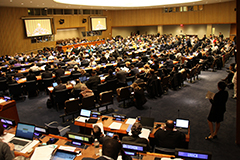
Last missing piece completes architecture of 2030 Agenda for Sustainable Development
As the final piece of the architecture for implementing the 2030 Agenda for Sustainable Development, the proposed global indicator framework for the Sustainable Development Goals (SDGs) was agreed by the 47th Session of the United Nations Statistical Commission which closed today.
※Completing the indicator framework is of course not the end of the story 每 on the contrary, it is the beginning,§ highlighted UN DESA’s Under-Secretary-General Wu Hongbo in remarks delivered by UN Assistant Secretary-General for Economic Development Lenni Montiel during the session.
United Nations Statistical Commission agrees on global indicator framework for monitoring progress towards achieving Sustainable Development Goals
Agreed as a practical good starting point, the set of 230 global indicators proposed by the Inter-Agency and Expert Group on SDG indicators (IAEG-SDGs) is a robust framework intended for follow-up and review of progress at the global level towards achieving the 17 SDGs, according to the report of the Statistical Commission.
Acknowledging that the development of a high-quality indicator framework is a technical process that will need to continue over time, ※refinements and improvements will be needed over the years, as knowledge improves and new tools and data sources become available,§ emphasized Mr. Wu. Moving forward, the IAEG-SDGs will work on the basis of the initial indicator framework, to review and refine the indicators as needed and to further develop the necessary methodologies.
Background to the Indicators
Global indicators are intended for the global follow-up and review of the 2030 Agenda and are not necessarily applicable to all national contexts. National ownership is key to achieving sustainable development and national reviews will take different national realities, capacities and levels of development into account. Moreover, it is expected that additional indicators for regional, national and subnational monitoring will be developed at the regional and national levels.

Countries have the primary responsibility for follow-up and review of progress made in the process of implementing the SDGs, which requires quality, accessible and timely data collection. In this regard, capacity building will be particularly important for all countries, including small island developing states (SIDs), least developed countries (LDCs), landlocked developing countries (LLDCs) and other countries in special circumstances.
Improving data disaggregation 每 by income, sex, age, race, ethnicity, migratory status, disability and geographic location or other characteristics 每 is also fundamental for the full implementation of the global indicator framework in order to leave no one behind as pledged in the 2030 Agenda.
※The SDG indicators will require an unprecedented amount of data to be produced and analysed 每 and it is evident that this will pose a significant challenge for national statistical systems, in developing as well as developed countries,§ underscored Mr. Wu.
The Statistical Commission will submit the initial global indicator framework to the Economic and Social Council (ECOSOC) and the General Assembly for adoption.
Starting in July this year, the UN High-Level Political Forum on Sustainable Development will oversee national and thematic reviews of the implementation of the 2030 Agenda. The Forum is expected to provide political leadership, guidance and recommendations on the Agenda*s implementation and follow-up, addressing new and emerging issues.
This year 21 countries 每 China, Egypt, Estonia, Finland, France, Georgia, Germany, Madagascar, Mexico, Montenegro, Morocco, Norway, Philippines, Republic of Korea, Samoa, Sierra Leone, Switzerland, Togo, Turkey, Uganda and Venezuela 每 will take part in the national reviews at the Forum on a voluntary basis.
Source: UN Department of Public Information

Follow Us